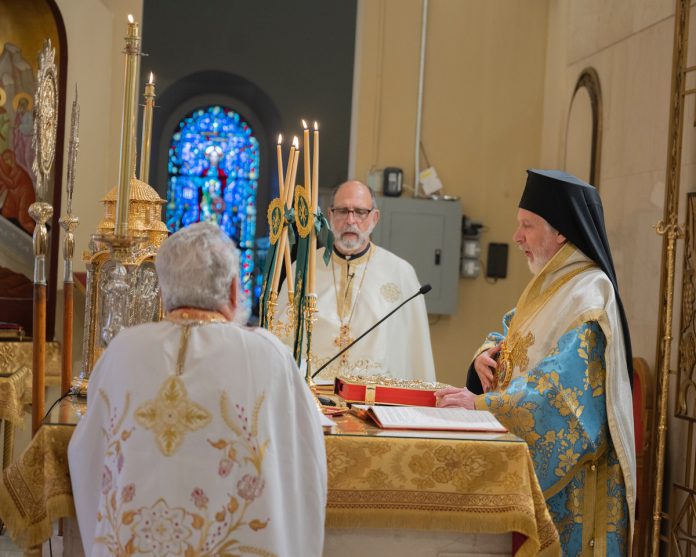Στα πλαίσια των εορτασμών της 100ετηρίδος από της ιδρύσεως της Ι. Αρχιεπισκοπής Αμερικής, η Θεολογική Σχολή του Τιμίου Σταυρού Βοστώνης διοργάνωσε διήμερο συνέδριο στις εγκαταστάσεις της, με θέμα “The Greek Orthodox Archdiocese of America at 100 Years”.
Προσκληθείς από τον Σεβ. Αρχιεπίσκοπο Αμερικής κ. Ελπιδοφόρο και την ως άνω σχολή, ο Σεβ. Μητροπολίτης Σουηδίας και πάσης Σκανδιναυΐας κ. Κλεόπας συμμετείχε στο εν λόγω συνέδριο, την Παρασκευή, 7 Οκτωβρίου 2022, αναπτύσσοντας στην αγγλική το θέμα “The Making of Archbishop Iakovos: How His Diakonia as a Priest Shaped His Archiepiscopacy”, πως δηλαδή η υποδειγματική ιερατική διακονία του Αρχιμανδρίτου Ιακώβου Κουκούζη στον Καθεδρικό Ναό της Βοστώνης συνετέλεσε στο να αναλάβει στη συνέχεια την πηδαλιουχία της Ι. Αρχιεπισκοπής Αμερικής.
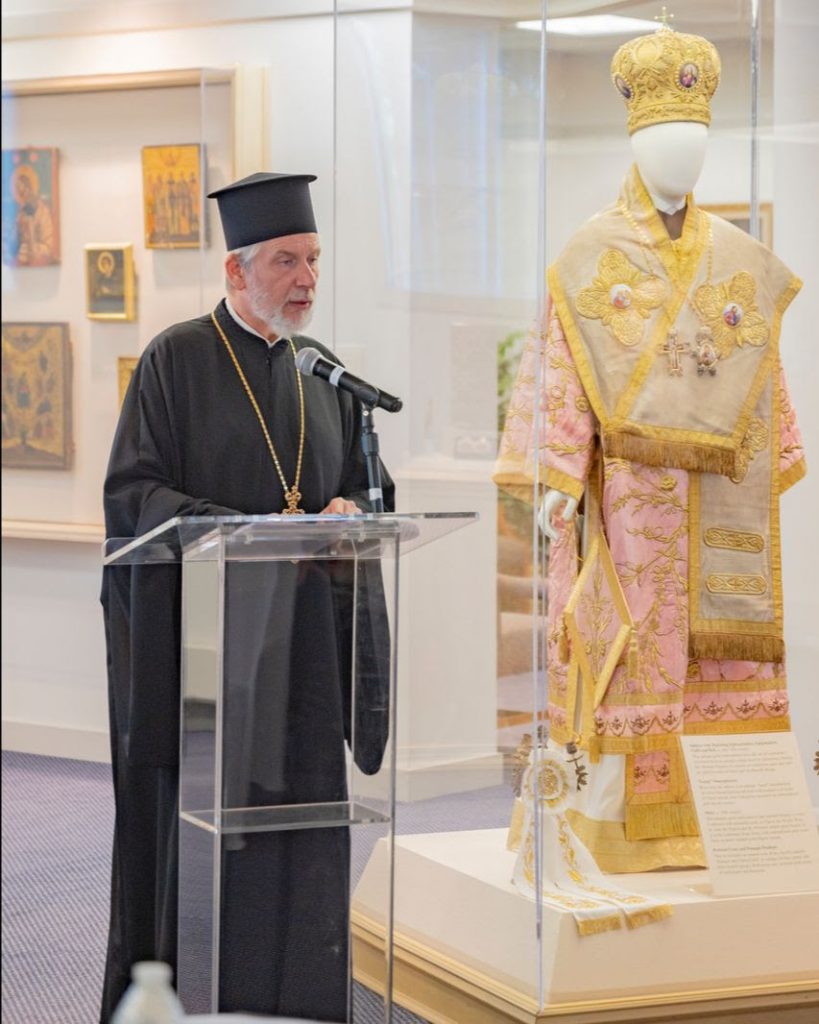
Η ομιλία βασίστηκε στη μελέτη που δημοσίευσε ο Μητροπολίτης Κλεόπας, το Νοέμβριο του 2012, κατά τη διακονία του ως προϊσταμένου του Καθεδρικού Ναού Ευαγγελισμού της Θεοτόκου Βοστώνης, με τίτλο “Dean James A. Coucouzes as a Model of Priesthood: Archbishop Iakovos’ Ministry at the Annunciation Cathedral of New England (1942-1954)”.
Στο τέλος της ομιλίας του, ο Επίσκοπος συνεχάρη τους διοργανωτές του συνεδρίου Πανοσιολ. Αρχιμανδρίτη Dr. Anton Vrame και Dr. James Skedros και προσέφερε αντίτυπα της μελέτης του για τον Αρχιεπίσκοπο Ιάκωβο στον Σεβ. Αρχιεπίσκοπο Αμερικής κ. Ελπιδοφόρο, τον Πρόεδρο της Θεολογικής Σχολής κ. George M. Cantonis, στον Dr. James Skedros και στον Καθηγητή του Haverford College Ελλογ. κ. Αλέξανδρο Κιτροέφ.
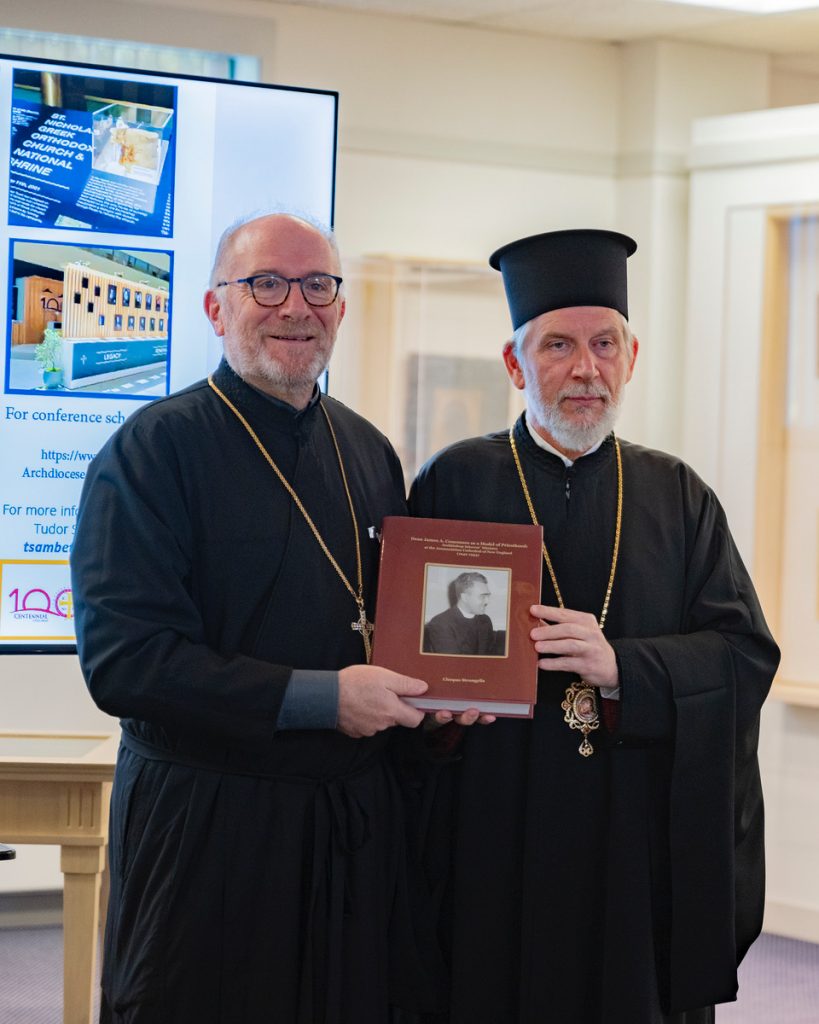
Την Κυριακή, 9 Οκτωβρίου, ο Σεβασμιώτατος λειτούργησε στον Καθεδρικό Ναό της Βοστώνης. Στην ομιλία του, ευχαρίστησε τον Σεβ. Αρχιεπίσκοπο Αμερικής κ. Ελπιδοφόρο, για την τιμητική του πρόσκληση, να συμμετάσχει ως εισηγητής στο διήμερο συνέδριο της Θεολογικής Σχολής, καθώς και τον Σεβ. Μητροπολίτη Βοστώνης κ. Μεθόδιο, με την κανονική άδεια του οποίου τέλεσε την ευχαριστιακή σύναξη, με τη συμμετοχή του προϊσταμένου του ναού Αιδ. Πρωτοπρεσβυτέρου κ. Αθανασίου Τσινίνη και του εξ Ελλάδος επισκέπτου Αιδ. κ. Βασιλείου. Τους ύμνους έψαλαν τρεις φοιτητές της Θεολογικής Σχολής του Τιμίου Σταυρού.
Αφού μίλησε πρώτα στους μαθητές του Κατηχητικού Σχολείου, ο Μητροπολίτης Σουηδίας εξέφρασε προς τα μέλη του Καθεδρικού Ναού της Νέας Αγγλίας την ευγνωμοσύνη του για την αγάπη που του έδειξαν καθ᾽ όλη τη διάρκεια της εκεί διακονίας του μέχρι σήμερα, τους προσέφερε τη μελέτη του για την Πατριαρχική Επίσκεψη στη Στοκχόλμη, συνεχάρη το νέο εφημέριο, π. Αθανάσιο για τον πρόσφατο διορισμό του, ευχήθηκε ταχεία αποκατάσταση της υγείας του απελθόντος εφημερίου Αιδ. Πρωτοπρεσβυτέρου κ. Δημητρίου Τόνια και κήρυξε το θείο λόγο, με θέμα την κυριακάτικη ευαγγελική περικοπή.
Ακολούθησε δεξίωση στις εγκαταστάσεις του ναού, την οποία προσέφεραν ευγενώς η Φιλόπτωχος Αδελφότης Κυριών και το εκκλησιαστικό συμβούλιο του ναού.
Το απόγευμα της ιδίας, ο Σεβασμιώτατος αναχώρησε από τη Βοστώνη, με προορισμό την έδρα της επαρχίας του, στη Στοκχόλμη.
Το φωτογραφικό υλικό είναι προσφορά του κ. Alex Mavradis.
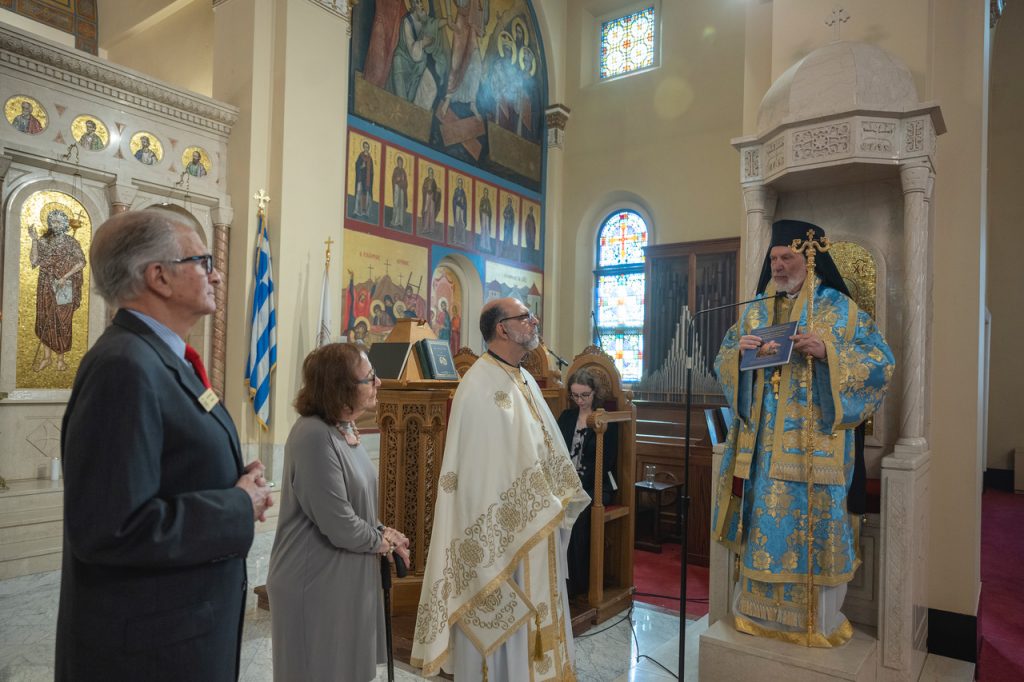
Metropolitan Cleopas of Sweden Visits Boston as a Guest Speaker
STOCKHOLM — To commemorate the 100th anniversary of the establishment of the Greek Orthodox Archdiocese of America, the Holy Cross School of Theology in Boston held a two-day conference on site at its facilities entitled “The Greek Orthodox Archdiocese of America at 100 Years.”
At the invitation of His Eminence Archbishop Elpidophoros of America and the aforementioned academic institution, His Eminence Metropolitan Cleopas of Sweden and All Scandinavia participated in the conference as a guest speaker, delivering his presentation entitled “The Making of Archbishop Iakovos: How His Diakonia as a Priest Shaped His Archiepiscopacy,” on Friday, October 7, 2022.
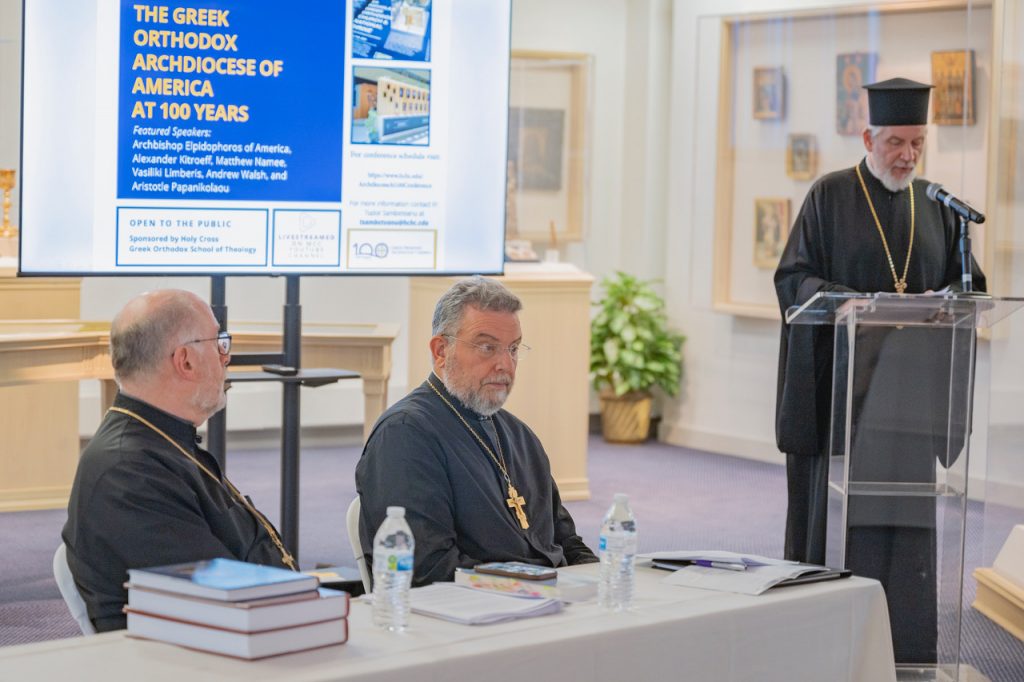
The presentation was based on a study Metropolitan Cleopas wrote in November 2012 during his ministry as Dean of the Annunciation Cathedral of Boston entitled Dean James A. Coucouzes as a Model of Priesthood: Archbishop Iakovos‘ Ministry at the Annunciation Cathedral of New England (1942-1954).
At the end of his speech, the Metropolitan congratulated the conference organizers V. Rev. Archimandrite Dr. Anton Vrame and Dr. James Skedros, while offering copies of his study on Archbishop Iakovos to Archbishop Elpidophoros, Holy Cross President Mr. George M. Cantonis, Dr. James Skedros, and Prof. Alexander Kitroeff of Haverford College.
On Sunday, October 9th Metropolitan Cleopas celebrated the Divine Liturgy at the Boston Cathedral. During his address, he thanked His Eminence Archbishop Elpidophoros for inviting him to participate in the conference as a guest speaker, as well as His Eminence Metropolitan Methodios of Boston with whose canonical permission he celebrated the Divine Liturgy together with the Dean of the Cathedral Rev. Protopresbyter Fr. Athanasios Tsininis and Fr. Vasilios, a clergyman visiting from Greece. The hymns of the day were chanted by three Holy Cross students.
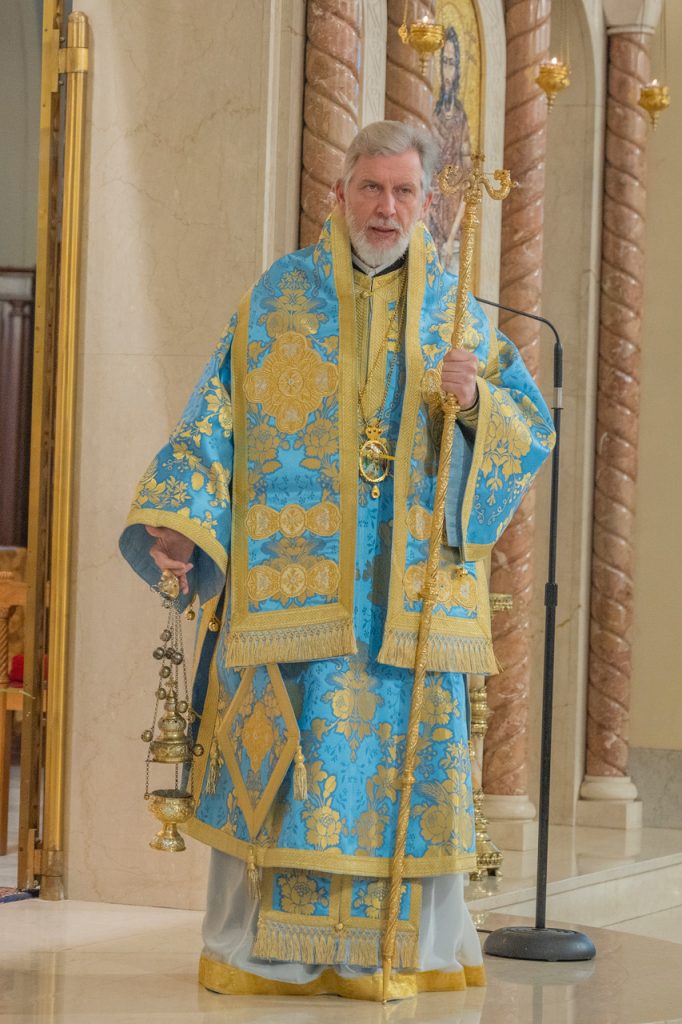
After first speaking to the Sunday School students, Metropolitan Cleopas expressed his gratitude to the members of the Annunciation Cathedral for the love they showed him from the start of his ministry there until today, offered them copies of his chronicle of the Patriarchal Visit to Stockholm, congratulated the new Dean of the Cathedral Fr. Athanasios on his recent appointment, wished the former Dean Rev. Protopresbyter Fr. Demetrios Tonias a speedy recovery, and delivered a sermon on the day’s Gospel reading.
A reception followed on site at the Cathedral, which was graciously offered by the Ladies Philoptochos Society and the parish council.
Metropolitan Cleopas left Boston that afternoon to return to his see in Stockholm.
Photo credit: Mr. Alex Mavradis
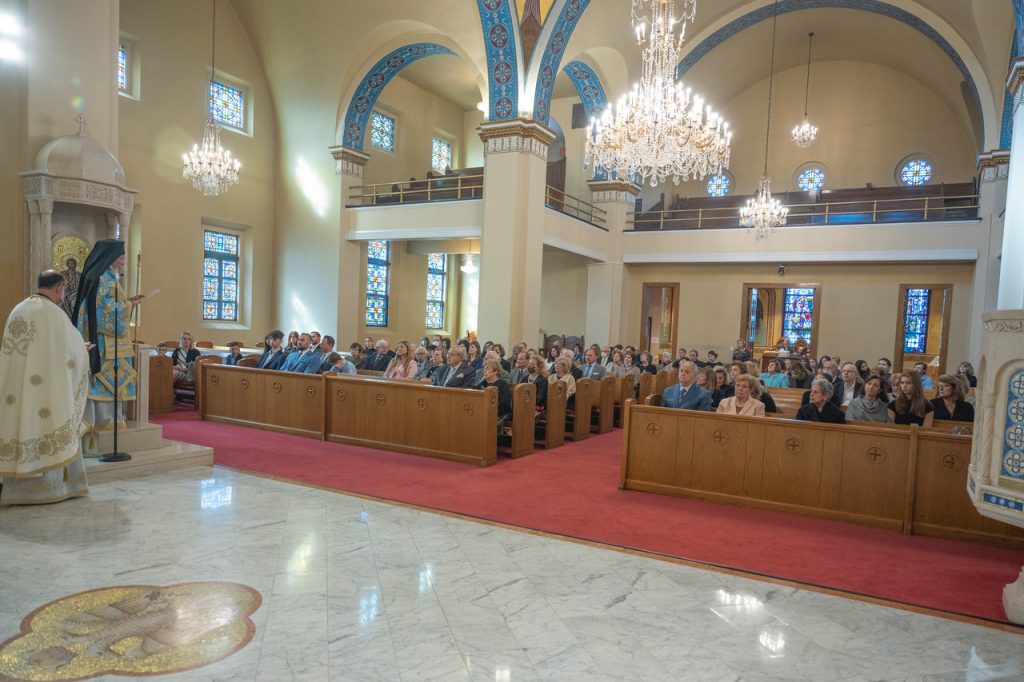
“The Making of Archbishop Iakovos:
How His Diakonia as a Priest Shaped His Archiepiscopacy”
Speech by His Eminence Metropolitan Cleopas of Sweden
at The Greek Orthodox Archdiocese of America at 100 Years Conference
Holy Cross Greek Orthodox School of Theology, Brookline, Mass.
Friday, October 7, 2022
Distinguished Organizers, participants and delegates,
Dearly Beloved Brothers and Sisters in Christ,
It gives me great pleasure to join you today and participate in this historic conference celebrating the Centennial of the Greek Orthodox Archdiocese of America. As I look across this room, I see many familiar faces and longtime beloved coworkers in the Lord’s vineyard, alongside whom I ministered in my twenty-two years of ministry here in the local Church of America.
As many of you may know, the ever-memorable Archbishop Iakovos played a central role in the assumption of this diakonia and the formative years of my priesthood, because he was the one who made my arrival to the United States possible. Thanks to a scholarship he so generously provided to me, I was able to come and pursue my graduate studies at the Holy Cross School of Theology, from where I began my priestly ministry here in the United States.
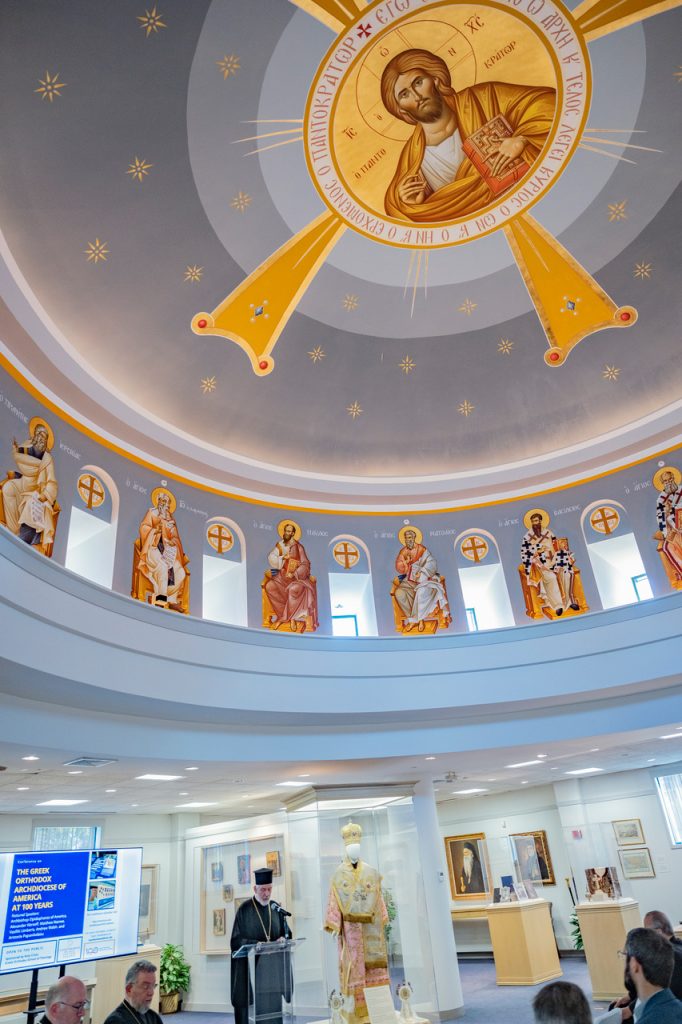
Archbishop Iakovos holds a special place in my heart. As Divine Providence would have it, this world renowned ecclesiastical statesman would have an especially symbolic presence in my diakonia here, because, in addition to making my arrival to the United States possible, I would also have the privilege of serving in the same capacity as he once did, as Dean of the Annunciation Cathedral of New England – my final assignment in the United States before my election to shepherd our Mother Church’s flock in Scandinavia with the blessings of His All-Holiness Ecumenical Patriarch Bartholomew.
I thought it appropriate to begin this speech with the words of Archbishop Iakovos, during a similar occasion, when he addressed the faithful at the celebration of the centennial of the Annunciation Cathedral: “For a Thousand Years in the Lord’s Sight are but as Yesterday when it is Past. And so, a hundred years went by as if they were but one day… Like one single day, planned out with devoutness, hard work, and pain by the first immigrants who came from Greece. A day that was written in the history of Hellenism in America with the blood from the hearts of those first immigrants. A day that, with the help of God, has been relived day in and day out, for a hundred years now, without missing a beat… Here in Boston, each day is but as yesterday and the days are illuminated from the same torch of our immortal people’s lasting legacy. Yesterday has not come to an end. It shines down on the road to the future like a powerful sun. And at the tip of the Hill of Hope, the beacon of Greek education and theology was built so as not to let yesterday come to an end. The centennial of Boston, with the celebration of tonight’s historic anniversary and participation by all of you in this event is a very beautiful display of your desire for Boston’s yesterday never to reach its end, while the cross—the Holy Cross of Hellenic College—extends its arms to you and embraces you all forever. Amen.”
And so, it is with these words, spoken by Archbishop Iakovos himself in 2003, near the end of his long and illustrious life and ahead of his own journey into history and immortality, that I touch upon this speech’s theme, which will focus on “The Making of Archbishop Iakovos: How His Diakonia as a Priest Shaped His Archiepiscopacy.” Although he served as a priest in St. Louis and briefly in New York as well, today we will focus primarily on his twelve-year ministry in Boston.
During my tenure as Dean, I was blessed to have had the opportunity to study his ministry in depth and publish a book dedicated to it, as part of the Cathedral’s initiative to honor one of the most historic figures associated with Orthodox Christianity in America. As I searched through the archives looking for information and interviewed parishioners who still remembered him as their Dean, I was astounded by how dynamic his pastoral work truly was.
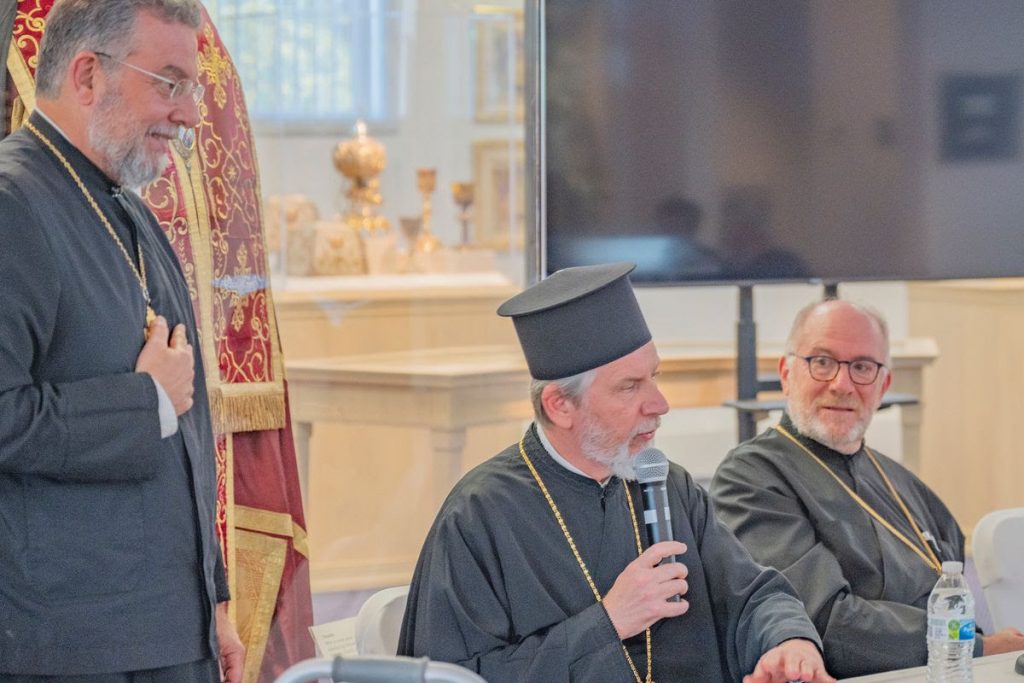
His typical workday lasted anywhere between 12 to 18 hours. His ministry began in the midst of a World War and extended into a Cold War. His responsibilities ranged from overseeing Greek language and religious education to engaging the youth, chaplaincies and campus ministry, charity both at the local level and especially for war-torn Greece, because of the Nazi occupation and a bitter civil war that followed, inter-denomination and interfaith relations, contact with civic and political leaders from the U.S. and Greece, including John F. Kennedy and the Greek royal family, church renovation projects, participation in events and initiatives sponsored by Greek federations and associations, acting as representative for the Archbishops of America under whom he served, initiatives on behalf of the Ecumenical Patriarchate, assistance with matters of church administration throughout his Diocesan district, including the active participation in Clergy-Laity Congresses and mediation of problems affecting neighboring parish communities, mentorship of assistant priests serving together with him, the delivery of sermons at worship services and through his radio ministry, and spearheading the effort to relocate the Holy Cross School of Theology to its present-day location here in Brookline.
As I researched his ministry, there were many instances when I thought to myself that his service at the Cathedral alone would make a wonderful course for our aspiring clergymen. In fact, I take this opportunity to make this suggestion here today. The pastoral ministry of Archbishop Iakovos, known then as Dean James Coucouzes, would make an excellent seminar and I believe that even students aside from our seminarians at Holy Cross would have much to benefit from studying it. His priestly diakonia is yet another legacy that Archbishop Iakovos left to the Archdiocese of America, and it clearly played an important role in preparing him to assume the helm of the Ecumenical Patriarchate’s largest eparchy, leading it through the second half of the 20th century up to the doorstep of the 21st century.
Today’s speech serves as a personal tribute to his greatness – a fitting recognition of the extraordinary work of a church leader of Archbishop Iakovos’ caliber and stature.
Those who knew him long before his elevation to the highest position in the Greek Orthodox Archdiocese of America can testify to his unique spiritual and moral qualities, which earned him a prominent position among the truly great churchmen and national leaders of our era. From the time of his appointment to the Cathedral, Archimandrite Coucouzes placed himself in the service of Christendom and the Hellenic ideals. His service embodied the ideal expression of the eternal moral values of both the Christian and Hellenic traditions which he held so dear to his heart. Regardless of all the complex challenges he faced, Iakovos relied heavily on his deep faith, courage, and devotion to teach his flock how the Lord and Hellenism should be served.
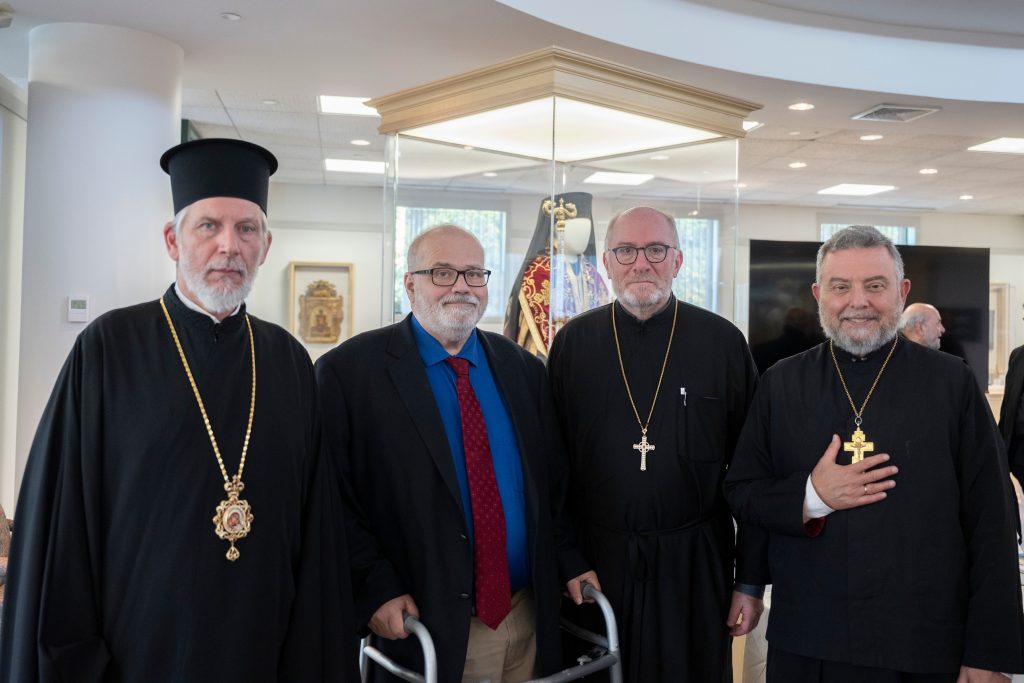
Because of his radiant and distinct personality, he was widely respected and loved. The sweetness and smile that graced his Constantinopolitan face earned this young cleric widespread acclaim. Most of all, I believe that the love this dynamic clergyman proudly stored in his heart served as his source of strength and courage for the fulfillment of his many pastoral obligations. Indeed, he was constantly energized and inspired by his deep faith and restless enthusiasm.
The Greek Americans of New England remember with gratitude and pride the fruitful years during which Archbishop Iakovos served as their Dean. A man of great compassion, gentleness, and charm, Fr. Coucouzes was a churchman of brilliant intellectual prowess, broad administrative vision, and compelling authority. His gentle manners and sincere friendship spoke with a language that appeals directly to the hearts of his listeners.
What gave Fr. James even greater strength for the success of his work were his close ties to his flock. There were no barriers or walls separating the people from their spiritual father. Strong in Christian conviction, this great leader brought accord to the local communities and order to the parishes of New England as the Vicar General of the then Diocese of New England. His ministry remains an unforgettable landmark in the history of the Church in America.
Due to time constraints, it is not possible to examine all the aspects of his dynamic ministry at the Annunciation Cathedral. Instead, I will limit myself to summarizing some example of the pastoral care he displayed for his parishioners. Next, I will briefly discuss his work with the youth, which ranged from overseeing their religious instruction in the parishes all throughout the Boston area to campus ministry and work with GOYA. Finally, I will provide some examples of his active concern and support of the Ecumenical Patriarchate, especially considering that being a native of the island of Imvros himself and a graduate of the Halki Seminary, he was nurtured by the lifegiving milk of the Mother Church and understood and empathized with the challenges it faced as well as anyone.
We begin by taking a closer look at Archbishop Iakovos’ pastoral ministry at the Annunciation Cathedral. One aspect of the pastoral care he displayed was helping to reconnect members of his flock with relatives from Greece or other states who were looking for them. Most of these instances involved persons from Greece who had contacted the Archdiocesan headquarters in New York to seek information regarding their relatives in America. The Archdiocese would forward the request to the Greek parish community to which the person belonged.
Additionally, Archimandrite Iakovos’ labor of love extended to supporting poor or sick members of the Community. Traditionally, one of the most important aspects of pastoral ministry in the Church has always been caring for the sick. The Greek Orthodox Archdiocese of America showed great care for Orthodox Christians who had fallen ill, regardless of whether they were members of the local Greek Community or visitors from Greece. In his capacity as Dean of the Cathedral, as well as Vicar General of the Diocese of Boston, Archimandrite Iakovos would frequently visit hospital in-patients, help raise funds to cover the medical expenses of Orthodox Christians in need, or direct local area clergy members to conduct hospital visits. He would also provide spiritual support to his ill flock by celebrating services at the City Hospital Chapel.
Another aspect of Fr. James Coucouzes’ pastoral ministry included visiting members of the Greek Community who were being held in prison. These visits would take place either at the request of the prisoners’ relatives or at the instruction of the Archbishop of America.
Fr. Coucouzes placed great emphasis on church attendance and his parishioners’ participation in the sacramental life of the Church. During his sermons, he would repeatedly stress how important and necessary it was that all the members of a family attend church together. He instituted the celebration of two Divine Liturgies on Sundays to better facilitate the needs of his flock. During the summer months, aside from the Cathedral, the Cathedral clergy used to celebrate the Divine Liturgy at a chapel in Nantasket, Mass. as well.
Another method of communication with the faithful of the Cathedral that Archimandrite Coucouzes and his aides would rely upon was a monthly – and subsequently bi-monthly – publication entitled “Annunciation” – a highly informative newsletter that contained sermons and spiritual admonitions from the Dean and the assistant priests, as well as commentaries and news regarding all the community programs in operation, which targeted all different age groups.
Yet another aspect of Archbishop Iakovos’ pastoral outreach during his tenure at the Cathedral involved extending his appreciation to his coworkers and aides for their hard work and dedication. Being wholly committed to his ministry and working non-stop, he relied heavily on the contribution of his fellow laborers in the Lord’s vineyard, who supported his diakonia. This gratitude is something he made a point to display actively, which is why he maintained close collaboration with many of his coworkers from Boston following his election as Archbishop, and even brought them along with him to the Archdiocesan headquarters in New York to serve alongside him.
The dedication displayed by the Cathedral staff led their dean to propose to the parish council that special honorary titles or “offikia” be bestowed upon them as a display of satisfaction and appreciation for their services. For example, when it came time to honor the Cathedral’s tireless sexton Haralambos Nikolakopoulos, Dean Coucouzes asked Archbishop Athenagoras himself to confer the honorary title upon him in front of the entire congregation.
The public recognition and symbolic display of appreciation to clergy and laypersons distinguishing themselves for their service to the Church is a practice that he would continue with great success as Archbishop, laying the groundwork for the establishment of important institutions like Leadership 100, which spearhead many projects for the benefit of the local Church and Community until today.
Now that we had an opportunity to briefly review some aspects of Archimandrite Coucouzes’ pastoral ministry, let us move on to focus on his relationship with a special demographic to which he placed great importance – the youth. His outreach to the younger generation was manifold and focused on different aspects of their lives – education, faith, and their role in the community, to name just a few.
The passing on of the ideals and traditions of the Greek people from one generation to the next in conjunction with the teaching of the Greek language was always high on the priorities of every Greek family in the Diaspora, and the wider spiritual family encompassed by the Church. One of the most dynamic undertakings assumed by Archimandrite Coucouzes during his tenure as Dean was the placement of all the regional Greek schools under one unified system of administration, which operated under his personal supervision and the auspices of his office. This initiative is mentioned in a letter he sent to Archbishop Athenagoras, wherein he informs the latter of the successful outcome of this effort, which was years in the making.
The dedication exhibited by Archimandrite Coucouzes for the organization and development of the Cathedral’s catechetical programs was historic. His widely respected predecessor Rev. Basil Efthimiou praised the ministry undertaken by his successor with the following words: “The Community of Boston in the last five years under the leadership of Archimandrite Iakovos Coucouzes has reached such great heights that not only the Holy Archdiocese but all its communities have it as a model.” According to Rev. Efthimiou, Iakovos was the first cleric in the history of the Archdiocese to encourage the American-born generation to involve themselves in the leadership of the Greek-American communities.
Right from the very beginning of his ministry in Boston, Archimandrite Coucouzes built a close and fruitful collaboration with the Cathedral’s Sunday School teachers, organizing instructional seminars and weekly meetings to help them realize their maximum teaching potential. To better serve the students, Dean Coucouzes would celebrate a special Divine Liturgy for children early on Sunday morning. He even secured buses for the transportation of the students to and from the Cathedral.
To ensure the highest possible quality of instruction, Archimandrite Iakovos – or Fr. Jack, as he was affectionately known among his English-speaking parishioners – also provided professional development for Sunday School staff through the hosting of annual Sunday School conferences. He even invited Archbishop Athenagoras to chair a Sunday School Conference hosted by the Cathedral in 1946, which the latter accepted, congratulating the organizing committee of the New England Sunday School Conference for their initiative.
Yet another aspect of his youth outreach includes his involvement with youth associations, like GOYA. In 1941 Archimandrite Coucouzes actually established an organization called “Greek Orthodox Youth,” also known by its Greek initials ΕΟΝ, ten years prior to the official establishment of GOYA in 1951.
The establishment of the “Annunciation League of Orthodox Young Adults” followed soon after GOYA. Some of the “Annunciation League’s” regular activities included monthly meetings, lectures by local university professors, the screening of films, luncheons, auctions, outdoor events, concerts, splash parties, skating parties, ski-weekends, dances, visits to the Harvard College Observatory, panel discussions, lectures, and national conferences.
As I mentioned earlier, one of the most successful spiritually-oriented activities he spearheaded were the “Youth Vesper Services,” which officially began in February 1951. Hundreds of young people from the surrounding area would attend, along with prominent clergy and academicians who would speak on areas of their expertise. Archbishop Michael congratulated Dean Coucouzes on his success in organizing the “Youth Vesper Services.” In addition, in 1951 the parish council of the Boston Cathedral sent a warm thank-you letter to their Dean at the end of their term in which the members express their pleasure over the exemplary collaboration they shared with him and “the miracle of the Sunday night Vesper services,” as they term it.
His interest in ministering to the youth earned him recognition beyond just the local Boston area. He received the distinction of being named Chairman of the Advisory Committee of the Archdiocesan Junior Youth Office. Seeking to gain new insight into this seminal ministry, Archimandrite Coucouzes attended the Massachusetts Conference on Children and Youth that was held in Boston in November 1950, and the National Youth Convention in Washington, D.C. in August 1952. The following year, he attended the GOYA Convention that was held in Birmingham, Alabama. Upon his return, he sent a report to Archbishop Michael in which he included specific proposals aimed at further improving the organization of this youth association. Among other things, he proposed the formation of Sunday School Associations and Choir Associations in an attempt to meet the demands of that era.
In addition to working with the youth in church, he would also minister to them outside the confines of their parish communities. For example, he engaged in Campus Ministry, making contact with Orthodox Christian students attending local area universities. He would invite to the Cathedral to network with other young people of their age, enjoy traditional Greek hospitality, benefit from the financial support offered by the Cathedral parishioners, and maintain contact with the local Greek Community. This service was of particular benefit to Greek students who had come to Boston from Greece or other areas of the U.S. to study.
The final portion of today’s speech will examine the concern and active support that Archbishop Iakovos displayed for the ancient institution of the Venerable Center of Orthodoxy – the Ecumenical Patriarchate – from his position as a parish priest. As noted earlier, he was a faithful son of the Mother Church, and although he served thousands of miles away, like any son who lives far from his mother, she is always close to mind and holds a central position in his heart. As a clergyman of the Ecumenical Patriarchate, where martyrdom has historically been a way of life and the most precious of victory crowns in the struggle on behalf of Christ’s Church, it was only natural for him to become a Συγκυρηναίος, another Simon of Cyrene, bearing the Lord’s cross on His way up to Golgotha!
Archimandrite Coucouzes’ concern for the Ecumenical Patriarchate and his fellow natives of Imvros was clear in all the stages of his priestly career. He held great respect for his spiritual father Metropolitan Iakovos of Imvros, with whom he kept in regular contact through written correspondence. His elder would keep him informed of the events taking place in the patriarchal court, and especially in his native island of Imvros.
The celebrations for the centennial of the founding of the Halki Theological School did not escape Archimandrite Coucouzes’ interest, considering that he graduated from this institution and was later invited to serve there as a professor and director. As soon as he received word of the celebrations from the Archdiocese, he held a similar celebration at the Annunciation Cathedral. Archbishop Athenagoras expressed his pleasure over this event and asked this dynamic graduate of Halki to send him the schedule of events so he could encourage other communities to put together similar celebrations.
Archimandrite Iakovos displayed concern for the financial support of the Ecumenical Patriarchate and the Metropolises belonging to it, as is evidenced in his letters. Dean Coucouzes’ initiative was to help the fundraising efforts undertaken by the Community of Agridia in Imvros, which was trying to raise funds to complete construction on its new school building and furnish it.
During Archimandrite Iakovos’ tenure at the Cathedral, he had the fortune to see Archbishop Athenagoras elected to Orthodoxy’s first throne. Based on their correspondence, it is clear that Athenagoras considered Iakovos to be one of his most beloved spiritual sons and relied on him as one of his closest and most dynamic aides during his ministry in the United States. Before Ecumenical Patriarch Athenagoras left for his new see at the Queen City of Constantinople, Dean Coucouzes expressed his wish to be included among the delegation that was to see the patriarch off and receive his blessing upon his departure. Together with his thanks, Athenagoras also sent the dynamic clergyman another letter encouraging him to be devoted to the new Archbishop and expressed his satisfaction for the support he had shown in the fundraising effort for the reconstruction of the patriarchal chambers that had been destroyed.
Athenagoras valued Iakovos’ ministry and assistance so much that he had decided to take him back to Constantinople with him, offering him the directorship of the Theological School of Halki and proposing his elevation to the episcopacy as his auxiliary bishop under the title of Bishop of Miletos.
This offer clearly posed a dilemma for the dynamic Archimandrite. Iakovos’ love for his flock and dedication to his ministry in the United States led him to reject Patriarch Athenagoras’ offer. It also appears that he was very committed to completing his ministry in Boston, to which we can attribute his rejection of other offers in the past, such as the deanship of the Annunciation Cathedral in San Francisco, the position of Chancellor of the Archdiocese of America, the directorship of a Missionary Center envisioned by Archbishop Athenagoras, and a professorship at the Halki Theological School in 1947. That’s why the news that Patriarch Athenagoras approved Archimandrite Coucouzes’ request to travel to the Phanar to pay his respects came like manna from heaven. The opening sentence of Fr. Coucouzes’ letter expresses his deep desire to repair his relationship with the patriarch: “I felt the joy of the Resurrection greater this year thanks to Your Paternal love and disposition to receive me on my trip to Constantinople.”
Archbishop Michael’s words regarding the bright future that lied ahead for Archimandrite Coucouzes proved prophetic in his letter of April 10, 1953, which he sent to the Ecumenical Patriarch extolling the virtues of this dynamic young clergyman with warm praise and expressing the pride of the local Church over his successful ministry. He also asked Patriarch Athenagoras to personally express the satisfaction of the Great Mother Church of Christ to this exceptional clergyman during their upcoming meeting.
Archimandrite Coucouzes’ love for the Mother Church of Constantinople is evident in his sermons. These feelings of filial love and devotion were displayed during his address to the newly elected Patriarch Athenagoras, his spiritual father and mentor in America. In this touching speech delivered in November 1948, Archimandrite Iakovos explains that the geographical distance between Constantinople and Boston is minimized by the unbreakable bonds of spiritual kinship.
“Your All Holiness, … The distance will not separate us. Distance is the space separating cities, countries, buildings, and people. But such a distance will not arise between us and you, because there is no distance between souls. And the communion shared by us and you is a communion of souls. Communion that arises from the common Cup. … This communion of souls will strengthen us and you. It will strengthen us in safeguarding the divine legacy that you have entrusted to us. It will strengthen you in safeguarding the sacred legacy that the Lord himself has entrusted to you.”
Ultimately, Iakovos’ tenure at the Annunciation Cathedral and ministry in the United States would come to a pause in October 1954, with his election as Bishop of Melita. Despite efforts by many prominent Greek-American figures, such as important benefactors like Thomas Anthony Pappas and Charles Maliotis to keep him in the area and see him elevated to Bishop of New England and Canada (something proposed after his previous election to the Diocese of Miletos), the Holy and Sacred Synod of the Ecumenical Patriarchate elected Archimandrite Coucouzes as Bishop of Melita on December 17, 1954 in response to a proposal that was made not by Archbishop Michael of America, but rather, by Archbishop Athenagoras of Thyateira, who had requested that Fr. Coucouzes be assigned as second auxiliary bishop to serve the area under his jurisdiction. Prior to this, Iakovos had resigned as Dean of the Annunciation Cathedral to become director of the Holy Cross School of Theology in Brookline, Mass. on December 10th of the same year. Ultimately, the time had come for Dean Coucouzes to spread his wings and apply his pastoral gifts to a wider region, responding to the needs of the Ecumenical Patriarchate.
Bishop Iakovos met with the Ecumenical Patriarch on numerous occasions to discuss the particulars of his new ministry. On February 11th, upon receiving the blessings of Ecumenical Patriarch Athenagoras, he left via Athens for his new post on the Administrative Committee of the World Council of Churches in Geneva. A little more than a year after his ordination, in April 1956, the Holy and Sacred Synod of the Ecumenical Patriarchate elevated him to titular Metropolitan of Melita in recognition of his successful ministry in promoting Inter-Christian dialogue and the ecumenical movement in general.
He would visit the United States during his five-year service as the Ecumenical Patriarchate’s representative in Geneva to aid his former parish community in its spiritual endeavors. And, as God’s will would have it, he would return permanently to the United States to fulfill his ministry in the New World as Archbishop of North and South America – a post to which he would dedicate the remaining decades of his life with immense success, self-sacrifice, and divine zeal.
In today’s speech, I tried to offer you a small taste of Iakovos Coucouzes’ priestly ministry and how it set the stage for his subsequent archpastoral ministry as primate of the Archdiocese of North and South America. Looking back at this period, I will allow Archbishop Iakovos himself to describe the seminal influence it had upon him. He noted the following in a speech to his former parishioners delivered on St. Iakovos’ Feast Day in 1990.
“… All I took with me were the blessed memories of twelve and a half years of ministry to the God-loving people of the Boston Cathedral. During those years, I nurtured my soul with their faith and commitment to Christ and his Holy Orthodox Church; I drew from the immortal water of their love. I enjoyed the immeasurable growth of the Sunday School children and marveled at the young adults of the community who were flooding the cathedral hall for Sunday vespers and Bible discussions by the most eminent interfaith speakers of that time. The New England Boston Cathedral still towers above me. I looked during those years of my pastorate upon its dome, crowned by a Byzantine cross, as I was deriving my strength to meet the challenge to uplift the souls and the minds of my people to their moral and spiritual height of Christianity.”
I conclude my speech by paraphrasing the thoughts shared by Archimandrite Coucouzes during the Annunciation Cathedral’s semi-centennial, which are equally fitting for the Archdiocese of America’s centennial.
It is not only the bells of the church that ring. The hearts of all of us are ringing and singing the ever-joyful song of the perpetuation of our heritage, faith, and spirit, which is reassured to me through this gesture of yours to speak at this centennial conference. In accepting this invitation, I feel that I am accepting a legacy—a legacy of the past for the future, a most valuable and most significant legacy which is a legacy of spiritual treasures, aims, and responsibilities.
Addressing Archbishop Iakovos looking down upon us from the Church triumphant, I would repeat his words and say “I assure you that the communicants of today’s Archdiocese won’t ever fail you. They will follow your footsteps and will make all possible efforts to continue, as well as promote your work. Your daring and creative spirit has become an integral part of our lives. Your soul is our soul. Your aspirations are ours. We will pursue their realization with the same humility you showed during the first century of our local Church’s life.
Before passing the threshold of the present going into the future, I ask the Almighty God for inspiration.” We also ask the blessing and guidance of His All-Holiness Ecumenical Patriarch Bartholomew, and the faith, loyalty, and love of you, my beloved brethren, so that as you chart the course leading to the Archdiocese’s second centennial, you will do so in wisdom.
During the celebration of the Annunciation Cathedral’s semi-centennial, then Archimandrite Iakovos had decided that the slogan for the next fifty years should be these words of St. Paul: “Walk in wisdom.” This timeless exhortation is just as meaningful today.
Therefore, “walk in wisdom” and make the bells of the Archdiocese’s churches from the Atlantic to the Pacific herald your steadfast resolution to uphold the ideals of our Hellenic and Christian civilization and tradition forever, following the legacy left behind by one of the finest churchmen of the 20th century – Iakovos the Imvrian, Archbishop of North and South America.
Thank you.

